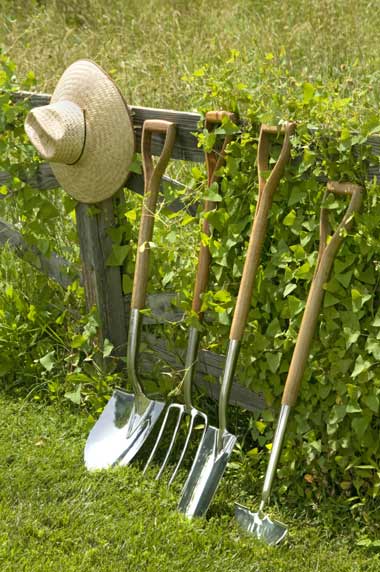當(dāng)前位置: Language Tips> 合作專區(qū)> 英語學(xué)習(xí)專欄
分享到

By Charlie Morgan
李薇 譯注
In Canada, many people like to plant a garden. Some plant flowers, some vegetables, and others like both. But, gardens are lots of work. So, people go to a garden centre to buy bedding plants[1]. You can get many flowers already started, so they’ll grow fast. You can also get small tomato plants. Do you have a garden? Do you want one? Can you help to take care of it? Or, will you only help to eat from it?
A: What are you going to do tomorrow? Are you free?
B: Sorry, I’ll be busy. It’s time to plant my garden.
A: Lucky you. I don’t have a garden. I live in a building. What’ll you plant?
B: I usually plant some vegetables and some flowers.
A: Which vegetables are you going to plant?
B: I’m going to have a row of carrots and a row of lettuce[2]. I already have the seeds. They’re easy to grow. And, I always plant some tomatoes.
A: Tomatoes fresh from the garden are delicious[3]. What else will you plant?
B: Last year, we had a cucumber[4] patch. They were good, but they sprawled everywhere. So, I’m not going to plant any this year.
A: I see. Will you plant any peas[5] or peppers? They’re my favorites[6].
B: No, peas are extra work, they need stakes. And, my peppers always die.
A: Oh, dear. What kinds of flowers are you going to plant?
B: I think I’ll just pick up some bedding plants. That’s faster.
A: Where’ll you get them?
B: There’s a garden centre in front of my local supermarket. I’ll pick up a nice assortment of colorful ones that are easy to look after[7].
A: I hope they all bloom for you. It sounds like a lot of work.
B: Yes, I have to turn over[8] the soil, dig holes, plant bedding plants and sow seeds, then water everything. But, that’s just the beginning.
A: Really? Is it hard to tend to a garden? What’ll you need to do?
B: I must weed the garden regularly, water it and fertilize it. I’ve got to watch out for bugs, too. Taking care of a garden is a lot of work.
A: Who’s going to help you?
B: Everyone will help me enjoy the garden but no one will help!
A: I’m glad I live in an apartment!
Vocabulary
1. bedding plant: 適于花壇種植的花草。
2. lettuce: 萵苣,生菜。
3. delicious: 好吃的,非常美味的。
4. cucumber: 黃瓜。
5. pea: 豆子。
6. favorite: 特別受喜愛的人(或物)。
7. look after: 照顧,照料。
8. turn over: 把……翻過來。這里指“翻土”。
Exercise
1. plant garden a. “shop” sells plants for gardens
2. row b. it doesn’t stay narrow, takes more space and
spread out over a wide area in an untidy and unattractive way
3. patch c. put seeds in garden
4. sprawl d. put seeds or baby plants in garden
5. stake e. good earth for garden
6. oh, dear f. to put a substance on the soil which makes
plants grow
7. pick up g. pull bad plants from yard or garden
8. garden centre h. one part of a garden (a flat square piece)
9. assortment i. One line of plants in a garden
10. colorful j. make a hole in the earth
11. bloom k. take care of a yard or garden regularly
12. soil l. different kinds together
13. dig m. flowers open
14. sow seeds n. a wooden stick tie flowers to it (in order to
keep straight)
15. tend to o. to be careful of something
16. weed p. buy quickly
17. fertilize q. bad news!
18. watch out for r. bright colors
Answers: 1–d, 2–i, 3–h, 4–b, 5–n, 6–q, 7–p, 8–a, 9–l, 10–r, 11–m, 12–e, 13–j, 14–c, 15–k, 16–g, 17–f, 18–o
Usage Tips:
1. 詞組take care of是“照顧,照料,照管”的意思,后面可與人搭配,如take care of babies or grandparents;還可與動物搭配,如take care of dogs;也可與物品搭配,如take care of cars。但如果說“照料花園或院子”,則一般要用它的同義詞組tend to,如tend to plants/gardens/yards,而且相較于take care of,tend to所表達(dá)的含義是“更規(guī)律、勤勞地進(jìn)行照看”。另外,tend to還有“往往會,常常”的意思,它與usually詞義相近,但程度較輕,如:I tend to sleep late on Sunday.
2. 當(dāng)sprawl一詞用于植物時(shí),它指的是“蔓生,蔓延”,即Plants grow too wide and get in the way of other plants,如:There were plants sprawling all over the place.(那里到處雜亂地生長著各種植物。)它還有“城市等無計(jì)劃地?cái)U(kuò)展或延伸”之意,如:A small resort town sprawling around the harbor.(一座旅游度假的小鎮(zhèn)逶迤伸展在海港周圍。)我們再看一個(gè)例句:The tired boy sprawled in a chair. 這里的sprawl則是“懶散地伸開四肢坐(或躺)”的意思。
(來源:英語學(xué)習(xí)雜志 編輯:丹妮)
分享到
關(guān)注和訂閱


關(guān)于我們 | 聯(lián)系方式 | 招聘信息
電話:8610-84883645
傳真:8610-84883500
Email: languagetips@chinadaily.com.cn